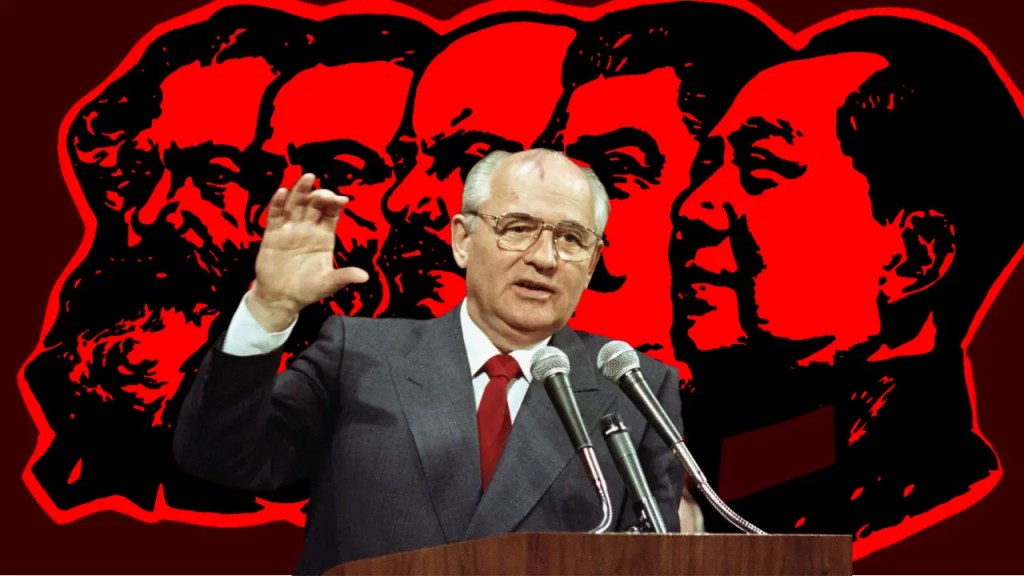Mikhail Gorbachev, the Soviet Union’s last leader and a reformer who helped end the Cold War but failed to prevent the Soviet Union’s collapse, died Tuesday at age 91.
Mikhail Gorbachev, former leader of the Soviet Union, died at the age of 91
Mikhail Gorbachev
George H.W. Bush, Ronald Reagan and Mikhail Gorbachev. 1988.
— Presidents and vice presidents doing normal shit (@NormaIPresident) August 30, 2022
The Former Soviet Union leader Mikhail Gorbachev has died at the age of 91. He was the last surviving Soviet Union leader. pic.twitter.com/pbGyVkH62Q
Gorbachev’s policies helped open up the Soviet economy and liberalize society. He was seen by many abroad as a visionary.
Gorbachev said watching the Nazis occupy his village as a boy shaped his life.
Mikhail Gorbachev was a Soviet Politburo member. He visited the Chornobyl nuclear power plant and took a ride in George H.W. Bush’s golf cart after a day at the presidential retreat in Camp David, MD. After an abortive coup, Gorbachev returned to Moscow and announced his resignation as general secretary of the Communist Party Central Committee. He later attended a meeting at the International University in Moscow.
Soviet Leader, Mikhail Gorbachev, has passed away at 92. Here he is in a 1998 Pizza Hut commercial. pic.twitter.com/saEwHfyBrO
— Morgan Cameron Ross (@Morgan_C_Ross) August 30, 2022
Gorbachev wanted to make the world less suspicious of communism
Mikhail Gorbachev offered direct disarmament talks with France, but François Mitterrand rejected the offer.
Gorbachev, a son of a poor farming family, arrived on the world stage and had to answer quite a lot of questions.
Gorbachev set his sights on Reagan, and the two men shared a belief they didn’t need to point nuclear weapons at each other.
Gorbachev’s response to Reagan’s question was met with laughter, and the Soviet leader traveled the world with his wife.
Jack Matlock, Reagan’s adviser on Soviet affairs, remembers preparing for one of the president’s most famous speeches at the Brandenburg Gate in Berlin in 1987. “Mr. Gorbachev, tear down this wall,” Reagan said to applause.
Matlock notes that although Reagan’s speech was made in 1987, the Berlin Wall came down in 1990. Gorbachev’s plans for the Soviet Union were different, and his system of perestroika was unleashing chaos inside Russia.
Hard-liners from Moscow knew Gorbachev was vulnerable, so they sent the head of the KGB to hold him hostage. Gorbachev told the KGB man he would never live that long.
Matlock, the Reagan aide, remembers the anger at Gorbachev and how Russians felt weak and hungry after Gorbachev brought down the Soviet Union.
Russian President Vladimir Putin and former Soviet President Mikhail Gorbachev talk before a press conference at Gottorf castle in Schleswig on Dec. 21, 2004. Grachev says Putin didn’t have the same kind of assurance, internal assurance, that he was showing even in the most difficult moments.
Ronald Reagan
Gorbachev was seen by many abroad, including Ronald Reagan, as a visionary, but his legacy is complicated at home.
Gorbachev and Reagan shared a belief that they didn’t need to point nuclear weapons at each other.
Reagan’s sense of ease sent a message that it was OK to like Gorbachev.
Jack Matlock, Reagan’s adviser on Soviet affairs, remembers preparing for one of Reagan’s most famous speeches at the Brandenburg Gate in Berlin in 1987.
Matlock notes that Reagan’s speech was made in 1987, but the Berlin Wall came down in 1990. Gorbachev’s system of Perestroika, his push for a more market-based economy, and his call for democratic elections unleashed chaos.
Matlock, a Reagan aide, remembers the anger at Gorbachev. Still, he also remembers seeing a different man return from Crimea to step down.
Andrei Grachev
Andrei Grachev, one of Gorbachev’s closest advisers, likened Thatcher’s endorsement to a Frank Sinatra song, saying that if Gorbachev could do it with Thatcher, he could do it with anyone else.
Grachev recalls Gorbachev’s pride in having accomplished something, and his shirt was wet.
Matlock, a Reagan aide, remembers the anger at Gorbachev. Still, Grachev, Gorbachev’s adviser, remembers seeing a different man return from Crimea to step down.
Grachev says he saw that something had broken inside Putin, and that he didn’t have the same kind of assurance he was showing even in the hardest moments.
The Communist Party Central Committee
Former Soviet leader Mikhail Gorbachev meets British Prime Minister Margaret Thatcher in Chequers on Dec. 16, 1984, and speaks to farm workers at a factory in Ramensky on Aug. 6, 1987. Gorbachev returned to Moscow after a failed coup and announced his resignation as general secretary of the Communist Party’s Central Committee.
Gorbachev was a young star in the Communist Party. By the time he was named Soviet leader in 1985, he was already courting Western leaders such as Margaret Thatcher.
Matlock notes that Gorbachev believed he could reform the Communist Party and create a more open society without losing Soviet power.
